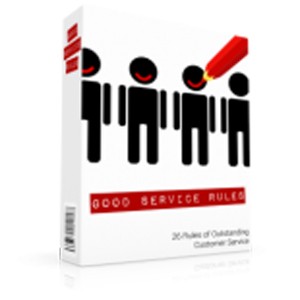
 License Type: Personal Use
License Type: Personal Use  File Size: 5,075 KB
File Size: 5,075 KB File Type: ZIP
File Type: ZIP
 SKU: 55010
SKU: 55010  Shipping: Online Download
Shipping: Online Download
Ebook Sample Content Preview:
16. Know your business
The best way to ensure the answers and help you provide to your customer is accurate is knowing your business, and the products/services it sells, inside and out. You (and your employees) should strive to know every liPle aspect of it in order to best serve your customers, and connect them with the solution that is right for their partcular needs.
Being unable to answer a queston from a customer without first consultng a manual (or even worse, Google) leaves them with a poor impression of your company, because to them it will seem like you don 't know what you' re talking about. On the other hand, if you seem like you know just about everything when they ask you, the opposite will be true and they ' ll be highly likely to trust your knowledge and opinions.
17. Reward employees who perform well
Offering rewards and bonuses to employees who perform well is usually a great idea. In the customer service department, however, you need to make sure you ' re not just rewarding your service reps based on the number of cases they ' ve handled successfully in a given period of tme. The reason is probably obvious: this would encourage your staff to only do the bare minimum to resolve as many issues as possible, never going that extra mile that ensures customers come back to your business.
If you have the means to do it, try to set it up so you can easily gauge customer satsfacton (for example by sending out surveys). Then, base your rewards and bonuses on the actual feedback you get from your customers. That should lead to bePer customer service overall.
18. Deliver on your promises
This may seem like a given, but it ' s important to menton anyway. Never promise more than you can actually keep, or you' ll end up with some extremely disgruntled customers. Breaking a promise you' ve made is sure to turn a customer off from doing any more business with you, and it just isn' t worth it.
If anything it ' s always better to under-promise and over-deliver. If you' re not sure you can deliver on something, better be safe than sorry and tell them you probably cannot do it. If it later turns out you actually can do it, they ' re likely to be pleasantly surprised and feel like you've really done your best to help them out.
19. Learn to apologize frequently
When something goes wrong, apologize. Even if it ' s just something minor, like a one day delay in shipping an item to a customer. Apologizing is just another way of showing that you accept responsibility and that you, as a business owner, care about your customers.
In fact, you should probably make a point of including an apology in every interaction with a customer when it ' s been established that they have a problem that is directly or indirectly caused by you or your company. It doesn't require much effort, but will go a long way towards making the customer a bit less hostile.
Don 't overdo this one though, as it only works if it seems like you're being sincere. People are often able to tell when you ' re not being honest and you' re just telling them what they want to hear, so try to make sure you really do mean what you say.
20. Own up to your mistakes
Everyone makes mistakes - including business owners and customer service reps. What ' s important is to never try to put the blame on someone else. As a business owner, mistakes are your responsibility, even if they weren' t directly caused by you. Own up to them and try to resolve them without causing a fuzz; that ' s really all you can do.
It may be tempting to tell a customer that "oh it ' s this and that person' s fault, they ' re new here", but the reality is that customers really don 't care about that. They care about geEng their problem solved, and want to know that you (the business owner) are on the case, even if you didn' t personally cause the problem in the first place.
Sometimes it ' s also a good idea to assume responsibility even if the fault actually lies with the customer. PuEng the blame on them is a sure way to get them defensive, and by not doing that you may be able to turn an otherwise unpleasant interaction into something much bePer for all parties involved.
21. Treat your customer service reps well
You should, of course, treat all your employees well, but it ' s often a good idea to take extra care keeping your customer service reps happy. If they ' re not happy they will likely provide poor service to your customers, directly affecting your business for the worse. A good rule of thumb is trying to treat your employees like you want them to treat your customers.
That ' s why it just makes sense to pay them a decent wage and offer them a good working environment. Working in customer service can be quite difficult and draining, so keep that in mind when you' re evaluating their performance.
If someone makes a mistake, let them know how to fix it but don' t be too hard on them. The most important thing is making sure they learn something from it and don't repeat it in the future.
22. Take complaints and criticism to heart
When a customer comes to you with a complaint, you have three choices. You can choose to ignore it completely (probably not a good idea). You can rectify the problem and hope it doesn't happen again. Or, you can try to learn something from it to prevent it from happening again.
It ' s easy to get defensive when someone complains about your business, especially if they ' re harsh about it. However, by just changing your perspective from treating it like a personal aPack to a helpful lesson, you can find that complaints and criticism are two of the best allies you have in perfecting and growing your business.
From time to time there will also be complaints that are completely unfounded, and those are obviously safe to just ignore. Some customers are probably mostly looking to vent, and those are unlikely to be of use to you for improvement purposes. Listen to their complaints with a smile and move on!







